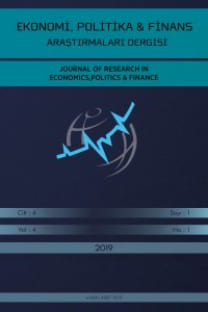Covid-19 Salgınında Borsa İstanbul Şirketlerinin Fiyatlamalarının Etkinliği
COVID-19, Borsa İstanbul, Aşırı Tepki Hipotezi, Hisse Senedi Getirileri
Efficiency of Market Pricing of Borsa Istanbul Companies During the Covid-19 Pandemic
COVID-19, Borsa İstanbul, Overreaction Hypothesis, Stock Market Returns,
___
- Aktaş. A. (2020, 23 Temmuz). 300 bin küçük yeni yatırımcı borsaya altı ayda 7 milyar getirdi. Dünya Gazetesi. Erişim adresi: https://www.dunya.com/kose-yazisi/300-bin-kucuk-yeni-yatirimci-borsaya-alti-ayda-7-milyar-getirdi/475923
- Alfaro, L., Chari, A., Greenland, A. N. and Schott, P. K. (2020). Aggregate and firm-level stock returns during pandemics, in real time (NBER Working Paper No.26950). Retrieved from https://economics.yale.edu/sites/default/files/schott_-_covid_market_reactions_085.pdf
- Anderson, K. and Brooks, C. (2006). The long‐term price‐earnings ratio. Journal of Business Finance & Accounting, 33(7‐8), 1063-1086. doi:10.1111/j.1468-5957.2006.00621.x
- Chen, C., Liu, L. and Zhao, N. (2020). Fear sentiment, uncertainty, and bitcoin price dynamics: The case of COVID-19. Emerging Markets Finance and Trade, 56(10), 2298-2309. https://doi.org/10.1080/1540496X.2020.1787150
- Clare, A. and Thomas, S. (1995). The overreaction hypothesis and the UK stockmarket. Journal of Business Finance and Accounting, 22, 961-961. https://doi.org/10.1111/j.1468-5957.1995.tb00888.x
- De Bondt, W. F. and Thaler, R. (1985). Does the stock market overreact?. The Journal of Finance, 40(3), 793-805. https://doi.org/10.1111/j.1540-6261.1985.tb05004.x
- EU Open Data Portal. (2020). COVID-19 cases worldwide. Retrieved from https://data.europa.eu/euodp/en/data/dataset/covid-19-coronavirus-data/resource/55e8f966-d5c8-438e-85bc-c7a5a26f4863
- Fama, E. F. and French, K. R. (1993). Common risk factors in the returns on stocks and bonds. Journal of Financial Economics, 33(1), 3-56. https://doi.org/10.1016/0304-405X(93)90023-5
- Göker, İ. E. K., Eren, B. S. and Karaca, S. S. (2020). The impact of the COVID-19 (Coronavirus) on the Borsa Istanbul sector index returns: An event study [Special Issue]. Gaziantep Üniversitesi Sosyal Bilimler Dergisi, 19(COVID-19 Special Issue), 14-41. https://doi.org/10.21547/jss.731980
- Griffin, J. M. and Lemmon, M. L. (2002). Book‐to‐market equity, distress risk, and stock returns. The Journal of Finance, 57(5), 2317-2336. Retrieved from https://www.jstor.org/
- Harjoto, M. A., Rossi, F. and Paglia, J. (2020). COVID-19: Stock market reactions to the shock and the stimulus. Applied Economics Letters, 1-4. https://doi.org/10.1080/13504851.2020.1781767
- Hassan, T. A., Hollander, S., Van Lent, L. and Tahoun, A. (2020). Firm-level exposure to epidemic diseases: Covid-19, SARS, and H1N1 (NBER Working Paper No.26971). https://doi.org/10.36687/inetwp119
- He, Q., Liu, J., Wang, S. and Yu, J. (2020). The impact of COVID-19 on stock markets. Economic and Political Studies, 8(3), 275-288. doi:10.1080/20954816.2020.1757570
- Howe, J. S. (1986). Evidence on stock market overreaction. Financial Analysts Journal, 42(4), 74-77. https://doi.org/10.2469/faj.v42.n4.74
- Huo, X. and Qiu, Z. (2020). How does China’s stock market react to the announcement of the COVID-19 pandemic lockdown?. Economic and Political Studies, 1-26. https://doi.org/10.1080/20954816.2020.1780695
- Kashif, M., Saad, S., Chhapra, I. U. and Ahmed, F. (2018). An empirical evidence of over reaction hypothesis on Karachi Stock Exchange (KSE). Asian Economic and Financial Review, 8(4), 449. doi:10.18488/journal.aefr.2018.84.449.465
- Keleş, E. (2020). COVID-19 ve BİST-30 endeksi üzerine kısa dönemli etkileri. Marmara Üniversitesi İktisadi ve İdari Bilimler Dergisi, 42(1), 91-105. https://doi.org/10.14780/muiibd.763962
- Kılıç, Y. (2020). Borsa İstanbul’da COVID-19 (Koronavirüs) etkisi. JOEEP: Journal of Emerging Economies and Policy, 5(1), 66-77. Retrieved from https://dergipark.org.tr/en/pub/joeep
- Lang, L. H. and Stulz, R. M. (1994). Tobin's q, corporate diversification, and firm performance. Journal of Political Economy, 102(6), 1248-1280. Retrieved from https://www.jstor.org/
- Liu, H., Manzoor, A., Wang, C., Zhang, L. and Manzoor, Z. (2020). The COVID-19 outbreak and affected countries stock markets response. International Journal of Environmental Research and Public Health, 17(8), 2800. doi:10.3390/ijerph17082800
- Lyócsa, Š., Baumöhl, E., Výrost, T. and Molnár, P. (2020). Fear of the coronavirus and the stock markets (ZBW – Leibniz Information Centre for Economics, Kiel, Hamburg). Retrieved from https://www.econstor.eu/handle/10419/219336
- Mazur, M., Dang, M. and Vega, M. (2020). COVID-19 and the March 2020 stock market crash. Evidence from S&P1500. Finance Research Letters, 101690. https://doi.org/10.1016/j.frl.2020.101690
- McKibbin, W. J. and Fernando, R. (2020). The global macroeconomic impacts of COVID-19: Seven scenarios (CAMA Working Paper No. 19/2020). Retrieved from http://www.sensiblepolicy.com/download/2020/2020WorkingPapers/2020_19_CAMA_COVID19_mcKibbin_fernando_0.pdf
- Merkezi Kayıt Istanbul. (2020). BIST trends report. Retrieved from: https://www.mkk.com.tr/tr-tr/Veri-Depolama-Hizmetleri/Sayfalar/Borsa-Trendleri-Raporu.aspx
- Phan, D. H. B. and Narayan, P. K. (2020). Country responses and the reaction of the stock market to COVID-19—A preliminary exposition. Emerging Markets Finance and Trade, 56(10), 2138-2150. https://doi.org/10.1080/1540496X.2020.1784719
- Ramelli, S. and Wagner, A. (2020). What the stock market tells us about the consequences of COVID-19. In Baldwin, R. and Weder di Mauro, B. (Eds.), Mitigating the COVID Economic Crisis: Act Fast and Do Whatever (pp. 63-71). London: CERP Press. Retrieved from http://www.itsr.ir/Content/upload/O79CB-COVIDEconomicCrisis.pdf#page=70
- Ritter, J. R. (2003). Behavioral finance. Pacific-Basin finance journal, 11(4), 429-437. doi:10.1016/S0927-538X(03)00048-9
- Shen, H., Fu, M., Pan, H., Yu, Z. and Chen, Y. (2020). The impact of the COVID-19 pandemic on firm performance. Emerging Markets Finance and Trade, 56(10), 2213-2230. https://doi.org/10.1080/1540496X.2020.1785863
- Tayar, T., Gümüştekin, E., Dayan, K. ve Mandi, E. (2020). Covid-19 krizinin Türkiye’deki sektörler üzerinde etkileri: Borsa İstanbul sektör endeksleri araştırması [Özel Sayı]. Yüzüncü Yıl Üniversitesi Sosyal Bilimler Enstitüsü Dergisi, (Salgın Hastalıklar Özel Sayısı), 293-320. Erişim adresi: https://dergipark.org.tr/en/pub/yyusbed
- Türkiye İstatistik Kurumu. (2020). Konut satış istatistikleri [Veri seti]. Erişim adresi: http://tuik.gov.tr/PreTablo.do?alt_id=1056
- World Health Organization. (2020). WHO timeline- COVID-19. Retrieved from https://www.who.int/news-room/detail/27-04-2020-who-timeline---covid-19
- Worldometer. (2020). COVID-19 Coronavirus pandemic. Retrieved from https://www.worldometers.info/coronavirus/
- Xiong, H., Wu, Z., Hou, F. and Zhang, J. (2020). Which firm-specific characteristics affect the market reaction of Chinese listed companies to the COVID-19 pandemic?. Emerging Markets Finance and Trade, 56(10), 2231-2242. https://doi.org/10.1080/1540496X.2020.1787151
- Zeren, F. and Hizarcı, A. E. (2020). The impact of covid-19 coronavirus on stock markets: Evidence from selected countries. Muhasebe ve Finans İncelemeleri Dergisi, 3(1), 78-84, doi:10.32951/mufider.706159
- Yayın Aralığı: Yılda 4 Sayı
- Başlangıç: 2016
- Yayıncı: Ersan ERSOY
Covid-19 Salgınında Çok Taraflılık ve ABD Liderliği Sorunu
Covid-19'un Gelişmekte Olan Pay Piyasası Oynaklığına Etkisi: Borsa İstanbul'dan Ampirik Bulgular
Latin Amerika’da Covid-19 Pandemisinin Sosyoekonomik Etkileri: Brezilya ve Meksika Örnekleri
Ceren UYSAL OĞUZ, E. Nur SEZEK
Covid-19'un Türkiye’de Bankalar Üzerindeki Ekonomik Etkisine Dair Bir Tahmin
İsmail BEKCİ, Eda KÖSE, Esra AKSOY
Avrupa Birliği’nin Covid-19 Yönetimi
Muzaffer AKDOĞAN, Aylin GÜNAY, Birsen SAY, Necibe GÜNDOĞAN GÜR
Covid-19’un Fransa Ekonomisine Etkisi ve Avrupa Ekonomisi Üzerine Bir Değerlendirme
Koronavirüs (Covid-19) Salgınının Hisse Senedi Piyasasına Etkisi: BIST 100 Örneği
Utku ÖLMEZ, Alper Aykut EKİNCİ
Covid-19’un OECD Ülkeleri ve Çin’de Makroekonomik Etkisinin Kümeleme Analizi
